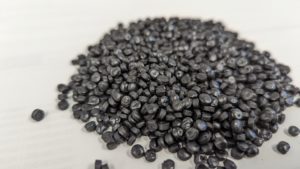Recycling is not ingrained in American culture, says Ian Arthurs, founder and CEO of Circular.co, a startup B2B marketplace for buying and selling recycled commodities. That’s why it’s important to make the process of finding high-quality recycled plastic easy, in this case for industrial B2B customers, he says.

Ian Arthurs, founder and CEO, Circular.co
“I think it’s inevitable for the plastics industry — and other manufacturing sectors that will need sustainable materials — that digitization will become the norm,” Arthurs says. “Because right now, it’s the process of going through a Rolodex and making phone calls. Physical industries will be able to buy things online using the way Amazon, Airbnb and Uber have created.”
Circularity is defined as a product that is created using materials that are later reused and reintroduced back into the manufacturing process, instead of disposed in a landfill. It is a business opportunity, Arthurs says.
Enter Circular.co.
Circular.co seeks to help the industrial sector manage its carbon footprint and reduce materials that end up in landfills. The goal is to do so in the most efficient way possible, Arthurs says. It’s a complicated task with significant ramifications for business and the environment. But with Circular.co, he’s showing how an internet marketplace can play a crucial role in realizing that goal.
“We aim to bring a real understanding of the economic opportunity and the importance of the current lack of [recycling/sourcing] infrastructure,” he says. Arthurs declines to share what it costs to use his marketplace but notes that subscription pricing varies, depending on factors such as volume.
A financial incentive to be sustainable
Currently, there is no easy, industrial-scale sustainability system in place to allow industrial manufacturers to recycle and reuse materials, he says.
Arthurs is tapping into his broad experience in ecommerce operations and marketplaces. He has worked as:
- Chief operating officer of Medium, an online publishing platform open to freelancers and other writers.
- Chief operating officer of TaskRabbit, an online marketplace that matches freelance labor with local demand. IKEA acquired TaskRabbit in 2017.
- Head of U.S. sales and operations at online lodging marketplace Airbnb.
- Head of travel advertising, online sales and operations at Google.
- Earlier positions include working in marketing for consumer-packaged goods giant Colgate Palmolive Co.
More corporations are considering their carbon footprints. In July, Singapore-based PCX Markets launched a global online marketplace allowing companies, including PepsiCo and Colgate Palmolive, to purchase certified plastic credits to offset their operations’ environmental impact. Again, it’s a financial incentive to be sustainable.
And time is of the essence. According to the report “Closing the Circularity Gap,” published by Google, Afara and IHS Markit in July 2021, 276 million metric tons of plastics are produced annually. Nearly 93% of that plastics material, or 256 million metric tons, come from virgin plastic supply chains made from petroleum products. Of that, only 7%, or 21 million metric tons, are recovered and make it back into the plastics supply chain as recycled material.
Recycling as an economic opportunity
Arthurs says it was imperative to ensure recyclers see the economic opportunity of recycling early on.
“Then, the recyclers go and pass that economic opportunity to the collectors,” he says. “Circular.co is not just a point or spot marketplace. It facilitates the entire sourcing, vetting and pricing process.”
So, how does Circular.co approach pricing?
“Walmart, Amazon — they can get real price negotiation because of their size,” he says.
It’s more difficult for medium-sized companies to obtain competitive pricing. It’s the first pain point Circular.co is determined to relieve, he adds.
“The issue is about access,” Arthurs says. “If a mid-sized beverage consumer product goods company wants to increase its use of post-consumer resin from 10% to 20% to 100%, we can help.”
One-stop-shop marketplace for sustainable materials
Help begins with a purchase order. Like any purchase order, it is what the customer wants to buy. If the customer wants to buy resin made from renewable resources, Circular contacts its network of recyclers in the U.S., Europe and Asia. Resin is typically sourced from a plant (usually from fir and pine trees), but many synthetic resins are produced by refining fossil fuels, like crude oil.
Circular matches recyclers with the customer based on the requested materials, and those recyclers send samples to the customer. Buyers and sellers submit orders and other related technical documents online. Customer service agents respond via live chat to questions from both sellers and buyers. Everything is centralized through Circular’s website, including payments.

Recycled plastics sold through Circular.co.
“Using our ecommerce platform is a lot less of a huge undertaking compared with scheduling multiple calls with different recyclers,” Arthurs says. “If a customer wants to know whether the intrinsic viscosity (a measurement of molecular weight and size used in polymer and protein research) is 0.8 and would like the certificate of analysis from the recycler, they can quickly request, get a response, and that’s it.”
Circular.co handles the negotiation and contract process
Circular also handles the logistics of the sampling process. If a customer requires 200 pounds of a sample sent to one factory location, for example, Circular’s live chat concierge service coordinates shipping and pricing between the customer and recycler. Recycled plastics buyers give Circular a budget. The concierge considers what the customer is willing to pay versus what the seller is willing to sell for.
“The concierge negotiates and facilitates that proposal,” Arthurs says. Customers that earn funds from green bonds like PCX, he adds, could use that money to pay for materials on Circular.co.
Circular draws up a contract for both willing parties after each step in the purchasing process is complete. Circular uses third-party services like HelloSign to sign contracts online. It also uses various application programming interfaces (APIs) to connect with shipping services as well as other applications. Circular’s technology platform integrates with Stripe for payments and with statistical analysis systems to collect, analyze and visualize marketplace data integrations through its platform. APIs are sets of software instructions that enable disparate software programs to share information and functionality.
“If a buyer was going to a seller or vice versa, they’d be figuring out how to process each step themselves,” Arthurs says. “That’s why we put it all in one spot.”
In ecommerce, it’s safe to assume that when a customer opens a chat window, that person is most likely interacting with a chatbot using artificial intelligence. This can be a frustrating back-and-forth process for specific and complicated questions. Not so with Circular.co, Arthurs says. He asserts that online chats are 80% to 90% human because of the complex nature of customer requests. The idea is to make the ordering process easier, not frustrating, to customers, he says.
Price transparency
Circular.co’s value is the access it gives to recyclers, collectors and manufacturers, Arthurs says.
“There is value in accessibility. You can’t get a really good deal if you can’t access the materials to begin with,” he says. “Our job is to take a customer’s purchase order or technical data sheet, and we’re going to find the market for it and negotiate the price.”
Depending on the size of the business, manufacturers can have a number of people dedicated to sourcing materials.
“One manufacturer I know has 60 sourcing people on phones trying to get materials,” Arthurs says. “Instead, we do all the chasing. The concierge helps companies navigate the Circular platform to find matches.”
Customers can keep track of orders using Circular.co’s digital dashboard, including proposals, technical data sheets, contracts and shipping prices.
After matching a buyer and seller, Circular’s concierge service also supports the sales process.
Pricing and accessibility
Buyers will continue to be price sensitive as the threat of a recession still looms, even as crude oil prices slowly declined in August, according to the U.S. Energy Information Administration. Arthurs says this landscape makes Circular’s services that much more valuable.
Currently, accessibility and quality of recycled materials are paramount. Once materials are more widely available, pricing will be the most important factor.
“The negotiating becomes important because we help our customers get a price break if they’re buying millions of pounds a month,” he says.
Arthurs says plastics is the first frontier. But eventually, Circular would like to offer other materials like metals, paper, and glass, among other materials.
“We plan on offering those options as well,” he says. “The demand side for sustainable materials exists. There’s a supply gap, and that can be aided through technology. That’s where we’ve placed ourselves. Whether rare earth materials, cement — for physical manufacturing, that’s where we go next.”
The goal for Circular is to prove itself with plastics. Then, onward to sourcing other materials online.
(This article is included in the special report, B2B Marketplaces Series Part II: B2B Marketplace Bonanza, from Digital Commerce 360.)
Sign up for a complimentary subscription to Digital Commerce 360 B2B News, published 4x/week, covering technology and business trends in the growing B2B ecommerce industry. Contact senior editor Gretchen Salois at [email protected].
Follow us on LinkedIn and be the first to know when new Digital Commerce 360 B2B News content is published.